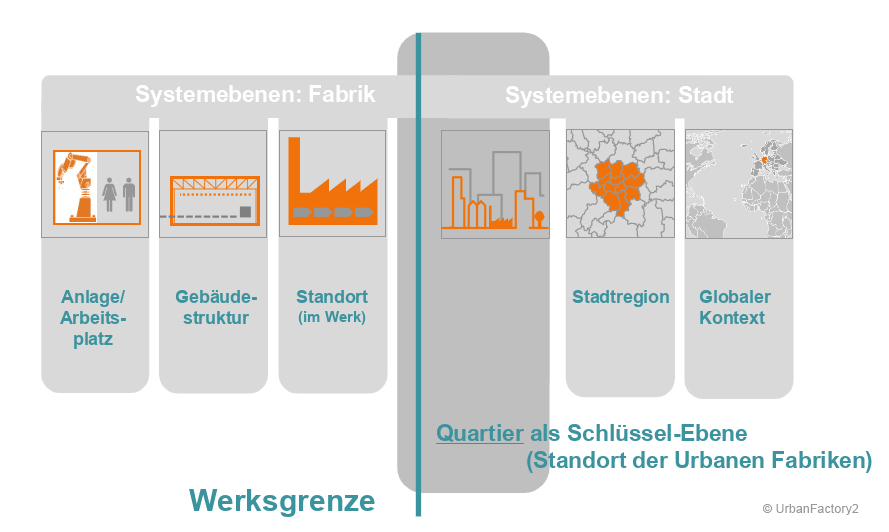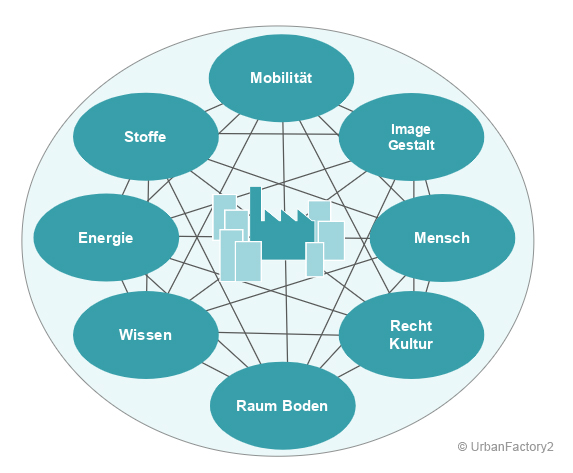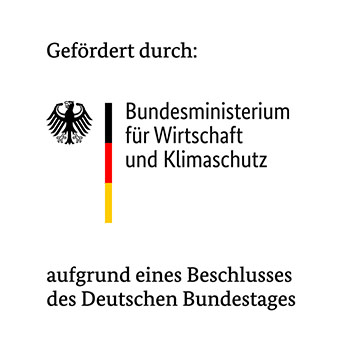The project and its objectives

Cities are constantly changing. They grow, they shrink, and they change, e.g. due to technological or climate change. Part of many cities, and thus also affected by their development, are production sites - both small and large scale. These also change over time. Spatially and functionally embedded in their respective dsitricts, they also influence their surrounding environment. Urban production sites generate resource and energy flows and trigger construction activities. However, they can also create innovations, jobs and wealth.
In the past, the development of urban districts and production sites were often considered separately. The project "Urban Factory II - Resource Efficient Urban Districts through Urban Production" considers them as one system, the "City-Factory-System". The project aims to synergistically connect the two system level - city and factory - to benefit from each other and to implement additional (resource) efficiency potentials for an overall sustainable system. It is based on the assumption that the overall potential for resource efficiency can only be significantly increased by production sites and surrounding urban districts together through their networking.

The basics: results from Urban Factory I
The research project Urban Factory II is the continuation of the project "Urban Factory - Development of resource-efficient factories in the city" (in German). Within the framework of this project, the theoretical foundations were laid under the guiding question "How do factory-city systems function more efficiently?". On the one hand, a deeper and common understanding of the two systems was developed and eight key resources were identified: Mobility, Image/Shape, People, Law/Culture, Space/Soil, Knowledge, Energy and Materials. In addition, more than 100 measures were collected to help urban factories improve their resource efficiency. Urban Factory II builds on these findings. Together with relevant actors in the urban factory system, the measures are to be applied in urban productions, further exchange potential is to be identified in the practical projects, measures for increasing resource efficiency are to be derived on the basis of data, and finally a network with a "lighthouse character" is to be established.
Participation of the DGNB
As a practical partner, the DGNB contributes its expertise in the development of certification systems, especially for buildings, districts and industrial sites, to the project. It supports the systematic development of evaluation criteria for urban production under sustainability aspects and makes them describable, measurable and assessable. The specific challenges of a more efficient use of resources in existing built environments are also examined and included.
The evaluation system to be developed should support the actors (especially urban factories) as an optimisation tool to continuously identify potential for improvement. It will also help to put into practice measures to increase resource efficiency that succeed in the long term from an ecological, social, and economic perspective for the overall urban-factory system.
- Project duration: 1 July 2021 to 31 July 2025 (49 months)
- Funding area: 7th Energy Research Programme of the German Federal Government
- Funding initiative: EnEff:Stadt
- Research executing agency: Federal Ministry of Economics and Climate Protection (BMWK)
- Project Management Organisation: Project Management Jülich (PTJ)
- Project management: Technical University of Braunschweig (TUBS) - Institute for Structural Design, Industrial and Health Buildings (IKE)
In addition, the DGNB team contributes its expertise in the context of specific sustainability-related analyses. Among other things, a so-called materiality analysis is to identify relevant factors for direct and indirect CO2 emissions. And potentials of the energy infrastructure are also taken into focus.
Increasing resource efficiency in urban districts through the targeted integration of urban factories touches on various scientific disciplines and stakeholders (e.g. research institutions, companies, regional economy, certification bodies and municipalities). In addition to the DGNB, 13 other partners are involved in the implementation of the project and the development of the results:
- Braunschweig University of Technology
- Institute of Construction Design, Industrial and Health Care Building
- Institute of Sociology, Department of Sociology with a focus on work and organisation
- Institute of Machine Tools and Production Technology
- Dortmund University of Technology
- Institute of Transport Logistics
- Braunschweiger Versorgungs-AG & Co. KG (BS|ENERGY)
- Institute for Environmental Strategies
- Wilhelm Ewe GmbH & Co. KG
- Volkswagen AG
- Wolfsburg AG
- City of Braunschweig
- Braunschweig Future GmbH
- National Jürgens Brauerei GmbH
- Schnellecke Logistics SE

